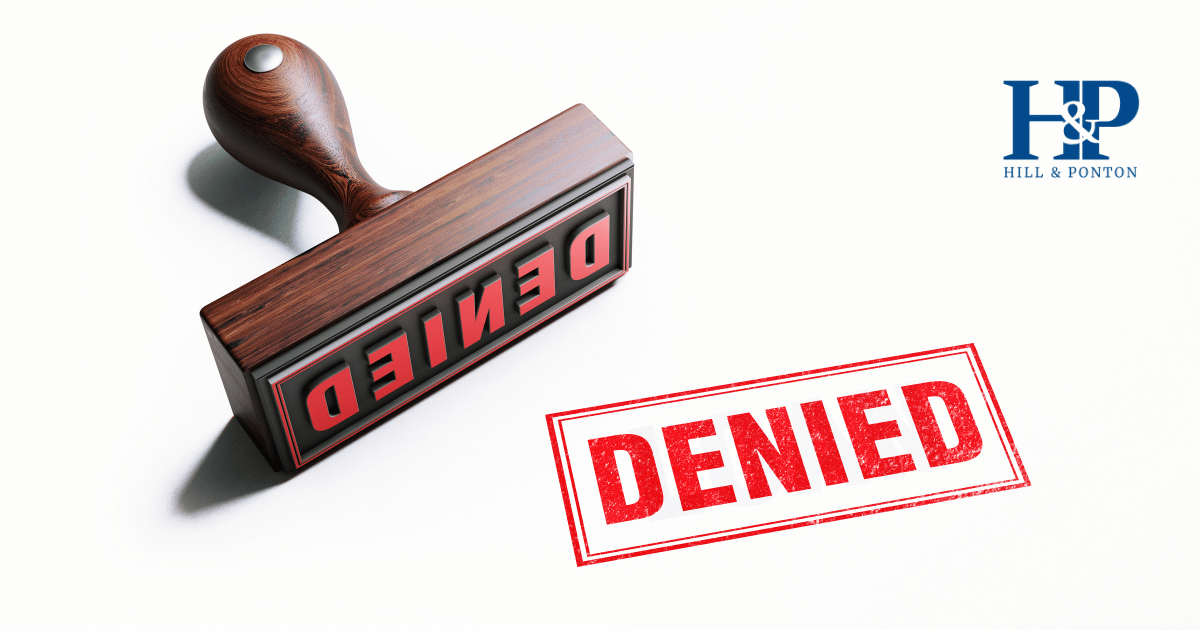You’ve been waiting to get VA disability benefits, after completing the long process of filing a claim. Then suddenly, you get the news: the VA has denied your claim. You may feel like you did everything asked of you, provided all the evidence that was requested, and yet you were denied the expected compensation.
Often the Veterans Affairs isn’t very clear about why you didn’t qualify for VA benefits, making the “claim denied” status that much more confusing. We’ll show you how you can find the reason hidden in the details of the decision letter – and how to turn the denial into an approval.
Find Out Why the VA Denied the Claim
Your first step will be to review your denial letter. The VA’s decision letter is more than just bad news — it’s a roadmap. VA is required to tell you why a claim was denied. Under each condition that was denied, look for specific reasons such as “insufficient medical evidence” or “no diagnosis.”
These details provide vital clues for identifying what’s wrong and how to address it in your appeal, whether it’s lack of medical nexus or documentation or some kind of error.
1. Missed Deadline
Probably the most critical reason that your VA disability claim could have been denied, might simply be because you missed the deadline.
Gathering evidence for your claim takes time. While there is no deadline to apply for benefits, you are only eligible for monthly payments to deal with current disabilities, so waiting around for an injury to fully heal, for example, may make you ineligible for compensation.
You also need to be aware of deadlines to appeal claims. If you do not appeal within the required period (typically 1 year) following an initial decision, you will need to refile your claim and start over.
2. Lack of a Specific and Current Diagnosis
In order for the VA to approve your claim for disability compensation, you must have a diagnosed medical condition that is the result of your military service (otherwise known as a “service-connected disability”).
The diagnosis must also be current. If, for instance, a veteran suffered from depression following their service, but since made a full recovery, then they are not entitled to receive compensation for the past issue.
3. Not Service Connected
To receive disability benefits, you must be able to prove that your disability is a result of your military service or was made worse by your service. Not service connected = VA claim denied!
If the VA determines that your medical condition is independent of your time in the military, or it was pre-existing (present before military service began), and wasn’t made worse by service, then you might not be granted disability benefits.
For a disability to qualify as service-connected, you must usually undergo a C&P exam by a qualified VA examiner.
4. Didn’t Pass the C&P Exam
In most cases, as a requirement for your disability claim, the VA will ask you to attend what is known as a Compensation & Pension (C&P) examination. This exam determines the extent of the current disability, and whether the condition is service connected, which qualifies you for compensation.
There are several things that can occur with these appointments that may have a negative impact on the results of a disability claim.
They can range from having an examiner that may not be qualified to examine your particular disability, appointments being made without adequately informing the veteran, rushed appointments or overly lengthy appointments, important tests or questions being skipped, etc.
If this happens, or if you can’t attend the examination at all, you should immediately inform the VA. These appointments are a crucial part of the VA disability claims process and should be treated as such.
5. Not Enough Evidence
A VA claim relies heavily on the support of evidence of your service-related disability. It can come in a variety of forms, from medical records, buddy statements, service records, etc.
When there was not enough proof submitted about the disability in a veterans claim, the VA will likely deny it. There are strict guidelines of what types of medical conditions qualify as disabilities and what level of compensation each veteran can receive based on the impact of the condition.
To find out how much you could potentially receive, check out our VA Disability Compensation Calculator.
Additionally, if your doctor did not adequately provide evidence and testing regarding your disability, it could also impact your claim or get it denied.
The next time you submit an application, you should include as much evidence as possible, to help minimize the likelihood of the VA doubting the legitimacy of your service-related disability.
Gather VA Disability Evidence
If your claim was denied, it often means additional evidence is required to succeed on appeal. Here’s how to strengthen your case:
- Update Medical Records: Obtain new test results, second opinions, or specialist evaluations to provide a clearer picture of your condition. If you receive treatment outside VA, make sure to collect those records or let VA know where you receive treatment – VA does not have automatic access to private medical records and must request those records.
- Build a Stronger Service Connection: Gather reports of in-service incidents, buddy statements, or other evidence linking your condition to military service. These personal accounts can help fill gaps in official records.
Examples of Evidence You Can Use
- Service Treatment Records (STRs): Medical records from your time in service documenting injuries or illnesses.
- Private Medical Records: Documents from civilian doctors or specialists demonstrating ongoing treatment or diagnosis of your condition (e.g., X-Rays, MRI, surgery reports).
- VA Medical Records: Records from VA clinics or hospitals showing treatment history, prescriptions, or diagnoses.
- Buddy Statements: Written statements from friends, family, or fellow service members describing how your condition developed or affects your life.
- Personal Statement: Written statement from you describing how your symptoms have continued since service, the impact of the symptoms on your daily life, or “filling in the gaps” on information missing from the record.
- Employment Records: Evidence of how your condition impacts your ability to work (e.g., leave records, performance reviews).
- Medical Nexus Letter: A letter from a physician explicitly linking your condition to your military service (e.g. a specific in-service event or injury that caused a physical disability).
What To Do When You Have a Mental Health Condition
Claims involving VA disabilities like PTSD, depression or anxiety require comprehensive documentation, which can include:
- Therapist or psychiatrist records documenting diagnoses and treatment plans.
- Medical records from VA or private providers showing evaluations, medications, or therapy participation.
- Personal statements describing how the condition affects daily life (e.g., struggles with work, relationships, or basic tasks).
- Buddy statements from family or fellow service members who observed the challenges caused by your condition.
- Incident reports or documentation of traumatic events during service.
- Expert evaluations linking your mental health condition to your service.
Choose One of These Appeal Paths
Start by filing a Decision Review Request (DRR) to challenge the VA decision. Submitting it within one year of the denial keeps your claim’s effective date intact. The DRR begins the appeal process, opening the door to several appeal paths:
- Higher-Level Review: A senior VA official reviews your case for errors. This option works best if you believe evidence already submitted was overlooked.
- Supplemental Claim: Allows you to submit new and relevant evidence for reconsideration.
- Board of Veterans’ Appeals: A chance to present your case to a judge, submit additional evidence, or request a hearing. While this process can take time, it often produces meaningful results when supported by strong evidence.
When facing a denied claim, make an informed choice. We may be able to assist you – get a free case evaluation here.
Appeal vs Reconsideration of a Denied Claim
In the legal realm, “reconsideration” is a term commonly used, but in the context of Veteran benefits, it officially exists only at the Board of Veterans Appeals (BVA) level. It involves filing an official “motion” and is limited to matters concerning potential “clear and unmistakable error.”
However, some Veterans and even advocates have mistakenly requested “reconsideration” at the Regional Office (RO) level, where no specific laws or regulations govern this process.
The lack of clarity leads to inconsistent and untimely responses from individual ROs, often confusing “reconsideration” requests with intent to reopen denied claims. This means veterans may inadvertently lose their appellate rights and entitlement to an earlier effective date.
“Reconsideration” at the RO level rarely results in favorable outcomes, as the same VA employee is likely to review the claim again. It also doesn’t grant additional time beyond the 365-day limit to submit an official Notice of Disagreement, so with limited time you should carefully consider the risks and benefits.
What Assistance Is Available to Veterans?
Navigating a VA denial alone can be challenging. Fortunately, there are two key support options available: Veterans Service Organizations (VSOs) and legal representation. Both offer valuable assistance, but each has unique benefits and potential drawbacks.
| Veterans Service Organizations (VSOs) | Legal Representation (Attorney) |
| Pros | Pros |
| Free assistance, making them accessible to all veterans. | Expert understanding of VA law and appeals processes. |
| Familiar with common VA claim and appeal requirements. | Personalized guidance for complex or high-stakes cases. |
| Help gather evidence, prepare appeals and interpret VA decisions. | Can identify errors and ensure all claim details are addressed. |
| Offer extensive experience working directly with veterans. | Increased likelihood of a favorable outcome in tough cases. |
| Often work on a contingency basis, meaning no upfront costs. | |
| Cons | Cons |
| May not be equipped to handle very complex cases or legal errors. | May involve fees if the claim is successful. |
| Limited resources can result in slower response times. | Legal processes can take longer and involve more formalities. |
When to Choose a VSO: If your case is relatively straightforward and you need general guidance, VSOs are an excellent, cost-free option.
When to Choose Legal Representation: For complex cases involving multiple denials or legal errors, a VA attorney’s expertise can make a critical difference in achieving a favorable outcome.
Get the Help You Need to Win Your Claim
Your VA denial isn’t the end — it’s the beginning of a new opportunity to secure the benefits you’ve earned. With the right strategy, evidence, and support, success is within reach.
With over 30 years of experience and more than $300 million in benefits recovered for our clients, Hill & Ponton has handled 30,000 claims, earning a reputation as trusted advocates for veterans seeking the compensation they deserve. Call us on 1-888-477-2363 for expert assistance.




